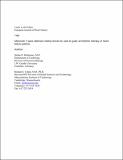Microvolt T-wave alternans testing should be used to guide arrhythmic therapy in heart failure patients
Author(s)
Cohen, Richard J.; Hohnloser, Stefan H.
Download20120515_Letter to European Journal of Heart Failure.pdf (65.96Kb)
OPEN_ACCESS_POLICY
Open Access Policy
Creative Commons Attribution-Noncommercial-Share Alike
Terms of use
Metadata
Show full item recordAbstract
Jackson et al. reported on a cohort of heart failure patients and concluded that microvolt T-wave alternans (MTWA) testing has limited utility in this population. Of note, this assessment was made in the complete absence of any outcomes data. The authors base their assessment on the fact that they deemed 318 of 648 patients to be ineligible for MTWA testing. The ineligibility was primarily attributable to the 38% incidence of atrial fibrillation which they reported while noting that this incidence was substantially higher than the 23% incidence reported in two earlier studies. Seventy-six patients were deemed ineligible for MTWA testing due to inability to exercise or continuous ventricular pacing. The authors ignored the availability of pharmacological and pacing protocols to test this latter group of patients. Moreover, patients who cannot exercise on a treadmill often are able to elevate their heart rate adequately for MTWA testing (≥105 b.p.m.) by means of isometric exercise or stepping in place.
Date issued
2012-05Department
Harvard University--MIT Division of Health Sciences and TechnologyJournal
European Journal of Heart Failure
Publisher
Oxford University Press
Citation
Hohnloser, S. H., and R. J. Cohen. “Microvolt T-wave alternans testing should be used to guide arrhythmic therapy in heart failure patients.” European Journal of Heart Failure 14, no. 6 (May 24, 2012): 677-678.
Version: Author's final manuscript
ISSN
1388-9842
1879-0844